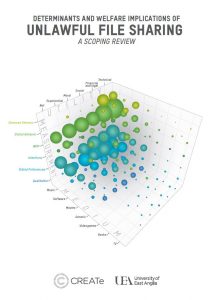CREATe Working Paper 14/5
Steven James Watson, Daniel John Zizzo and Piers Fleming (2014)
Executive Summary
- A scoping review was carried out to investigate and summarize the extent and nature of research (2003-2013) into the welfare implications and determinants of unlawful file sharing.
- Articles on unlawful file sharing for digital media including music, film, television, videogames, software and books, were methodically searched for within academic databases and a pre-publication repository; non-academic literature was sought from key stakeholders and research centers.
- 54,441 sources were initially found with a wide search and were narrowed down to 206 articles which examined human behavior, intentions or attitudes.
- Whether unlawful file sharing confers a net societal cost or benefit to welfare remains unclear based on the available evidence, with both of the approaches employed – a) looking at the association between sales and unlawful file sharing, and b) examining people’s willingness to pay with and without the possibility of unlawful file sharing – suffering from serious limitations.
- We provide a conceptual economic model to consider the factors that go into the decision whether to engage in unlawful downloads, legal purchases or neither. Potentially relevant factors relate to financial and legal utility, experiential utility, technical utility, social utility, and moral utility.
- The scoping review and the economic model allow us to identify a cubic representation of the volume of studies available on unlawful file sharing based on decision making factor (utility type), medium/market and type of measurement of unlawful file sharing (see figure below).

- The cubic representation illustrates the comparative scarcity of studies that employ observed behavior as a measured outcome, whether from the experimental laboratory or from the natural world. This is a problem, particularly as there is often a gap in findings between studies that use behavior and studies that do not.
- The vast majority of the studies employ cross sectional survey studies which make attributions of causality extremely difficult.
- The unlawful file sharing debate seems to have been predominantly determined by evidence from music files. Movies and software are a distant second. There is very little on videogames, books, or TV content. However, there is evidence to suggest that the determinants and welfare implications of one medium may not apply equally to another. Therefore there is a danger in basing policy decisions upon evidence heavily biased toward a single medium.
Potentially predictive factors
- Financial and Legal Utility: High prices appear to reduce sales but there is no clear evidence of an effect of price or income on unlawful file sharing. However, unlawful file sharing is associated with lower willingness to pay for content. Legal implications can be compared across countries and over time as new laws are introduced and in both cases stronger laws appear to reduce unlawful file sharing; however, there is limited behavioral data which could confirm a causal, legal effect.
- Experiential Utility: Unlawful file sharing may be influenced by a desire to sample new content, to access niche content, to build a collection or general interest in the content but there is a need for further evidence concerning these experiential factors.
- Technical Utility: Several accounts suggest an initial barrier to unlawful file sharing, such as availability of legal alternatives or perceived technical risks which reduce intent to file share. There is also a need for behavioral evidence to support initial indications that the relative availability of unlawful versus legal content, ease of unlawful file sharing, and technical ability, increase the likelihood of unlawful file sharing.
- Social Utility: There was correlational evidence that measures of individual unlawful file sharing were associated with measures of peer unlawful file sharing, but behavioral evidence is unavailable.
- Moral Utility: Moral beliefs were correlated with measures of reduced unlawful file sharing, but behavioral evidence is lacking.
- Demographics: Older people are less likely to engage in unlawful file sharing or to have positive attitudes about it.
Associated Downloads
- Determinants and Welfare Implications of Unlawful File Sharing: A Scoping Review (PDF format)
- Supplement 1 – List of Included Studies (PDF Format)
- Supplement 2 – Data Extraction Form (Microsoft Excel Format)

